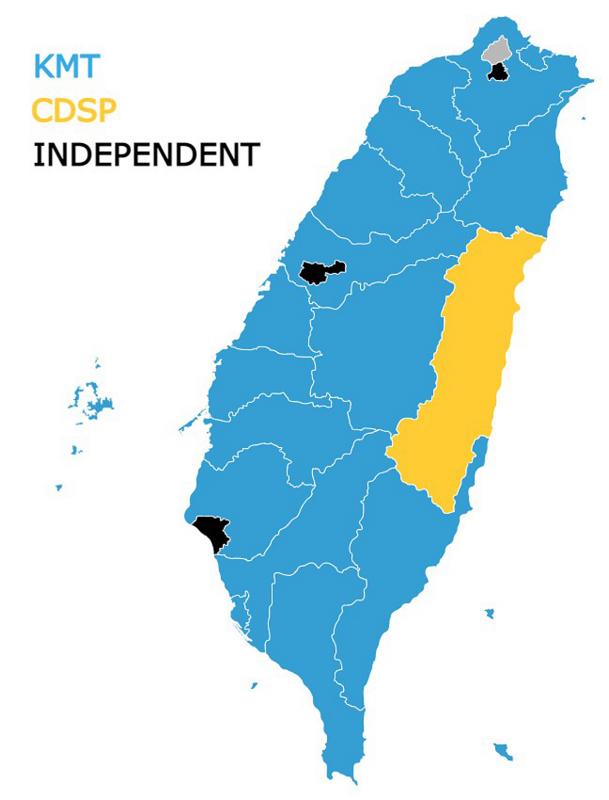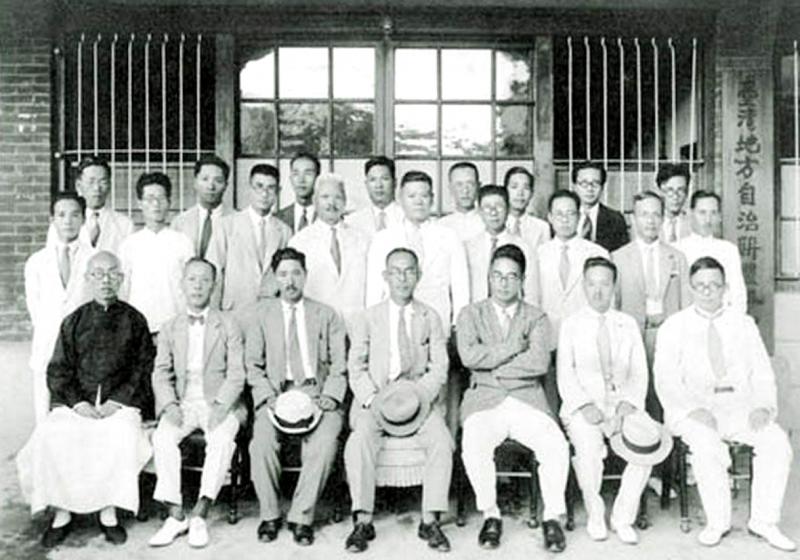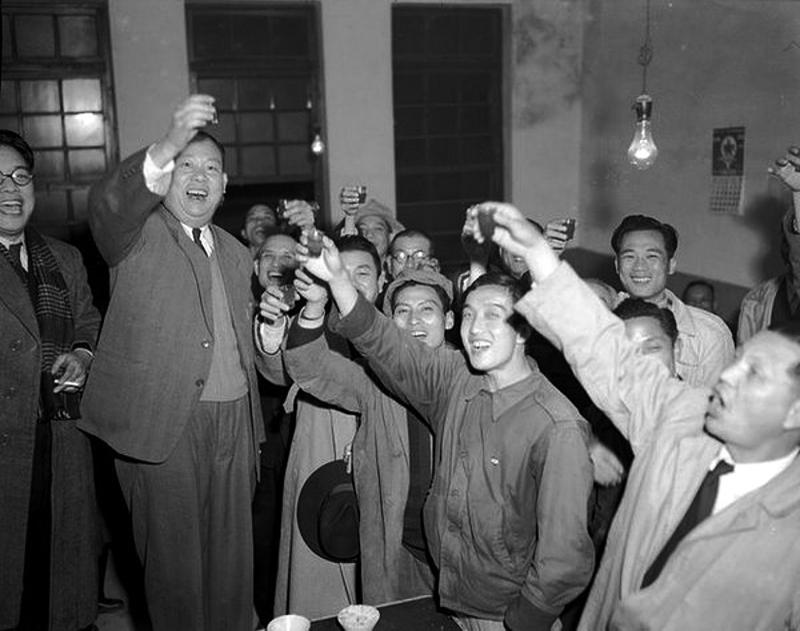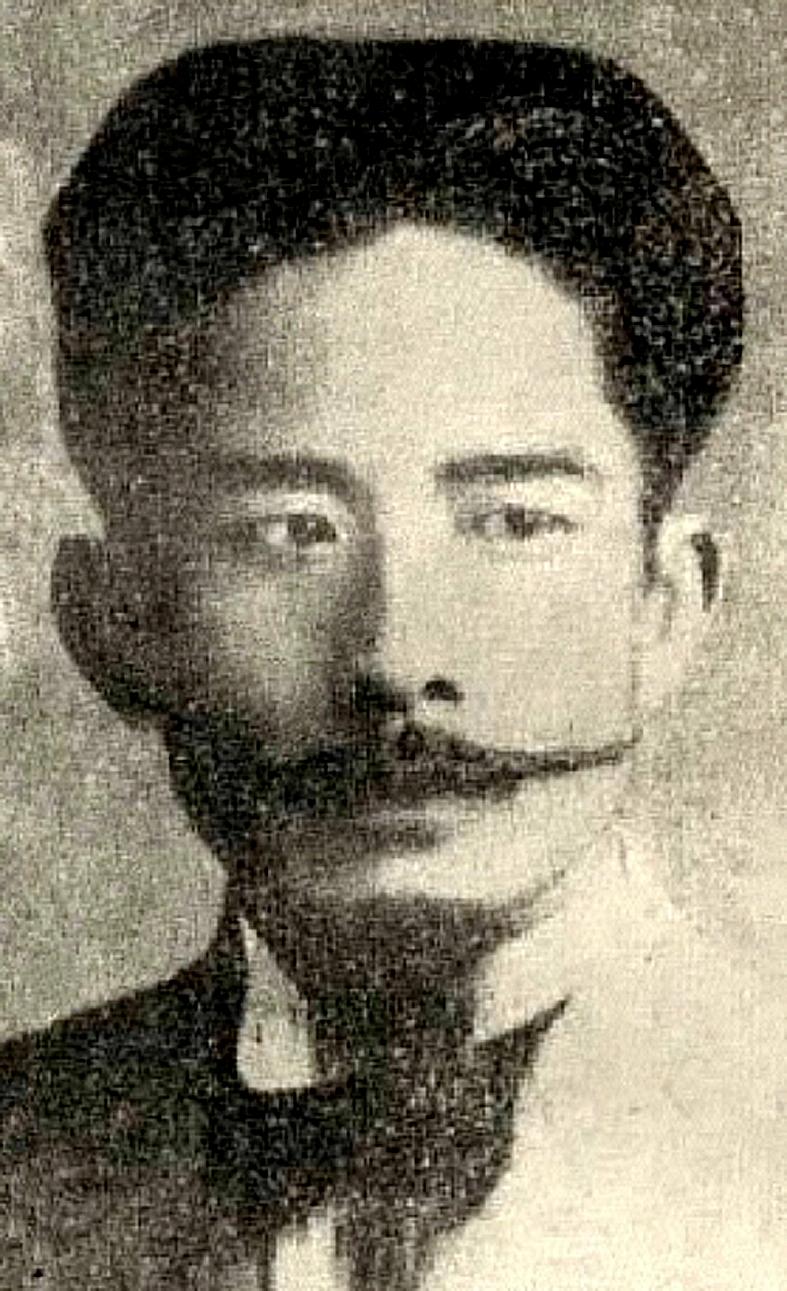Oct. 11 to Oct.17
After more than two decades of fighting the Japanese government for local autonomy, the “Taiwanese Lion” found himself running the show in 1950.
The fiery political activist Yang Chao-chia (楊肇嘉) was a 58-year-old public servant by then, serving as the Chinese Nationalist Party’s (KMT) minister of civil affairs. His nemesis, the Japanese colonial government had left at the end of World War II, and the new government had tasked him with running Taiwan’s first direct mayoral and county magistrate elections.

Graphic: Han Cheung
Yang started his career as an activist pushing for a Taiwanese representative assembly in the Japanese Diet. When that didn’t work he launched the Taiwan Local Autonomy Alliance and persuaded the Japanese to allow limited city and township council elections in 1935. They even got many alliance members elected to office.
This early experiment in democracy was quickly quashed as Japan entered its imperial phase, and even though the KMT was far from the savior Yang had hoped for, full and direct local elections were more than what he ever had under the Japanese.
“My dream of many decades has come true,” he writes in his autobiography.

Photo courtesy of Wikimedia Commons
Surprisingly, the first victory went to a non-KMT: Yang Chung-ching (楊仲鯨) took Hualien County in October 1950 as a member of the Chinese Democratic Socialist Party (中國民主社會黨). Independent candidates also prevailed in Taipei, Taichung and Tainan.
It seemed that democracy was alive and well — except that new political parties were banned, martial law was in effect and KMT leader Chiang kai-shek (蔣介石) ran pretty much unopposed for unlimited presidential terms. Chiang had to allow some sort of democracy to live up to his claim of being “Free China,” however, while at the same time, local elections allowed at least some opposition voices in the government.
LIMITED CONCESSIONS

Photo courtesy of Wikimedia Commons
Yang also served as a public official under the Japanese, but he committed career suicide when he traveled to Japan to petition the Diet to establish a Taiwanese representative assembly. The governor-general’s office tried to stop him from going, but he was already fed up with working for them.
Yang later studied economics at Japan’s Waseda University. On graduation day, he was visited by Taiwanese democracy activists who asked him to return home.
Yang was already set on his goals then, writing: “I propose that we push for local autonomy in Taiwan, separating the right to governance from the right to rule. I believe that under international circumstances and our current reality, it will already be a challenge for Taiwanese to achieve local governance. We wouldn’t dare dream of more than that at this point.”

Photo courtesy of Wikimedia Commons
He initially declined to return. The resistance in Taiwan was rife with infighting as different factions pushed their agendas. In 1930, Yang received a letter signed by Lin Hsien-tang (林獻堂) and over 20 other prominent activists inviting him to start a group, whose only goal was to achieve local autonomy. Glad that they took up his proposal, he immediately left Japan.
The democracy alliance toured Taiwan giving speeches: the first one in Taichung attracted 1,500 people. The Japanese police stood by, and anyone who said anything out of line was removed. To combat this, the alliance prepared 190 speakers for one event, running through 35 of them before finishing.
After campaigning for five years, the government finally agreed to hold elections for half of the colony’s city and township councilors. Voting rights were restricted to males over 25 years old and who paid over a certain amount of taxes, which resulted in more Japanese being able to vote than Taiwanese, despite them only making up five percent of the population in 1930. Yang repeatedly protested to the governor-general, but to no avail, and was later knifed by a pro-government assailant.
Despite the severely limited scope, the elections were still a big deal to Yang as they represented a historic first step. The occasion gained attention in Japan, and Japanese politicians as well as the press sent congratulatory telegrams to the alliance, whose members traveled the colony explaining the election’s significance, ethics and rules to the people.
The low number of eligible voters is staggering. Despite a turnout rate of over 90 percent, Taihoku (Taipei) city council’s top vote-getter, Tsai Shih-ku (蔡式穀), an alliance member, received just 1,245 votes (out of an estimated 60,000 eligible voteres). The second elections in 1939 were slightly better, with eligibility increased by about 60 percent. However, with the alliance disbanded there were far fewer Taiwanese candidates, leading to several city councils being 100 percent Japanese.
The 1943 elections were canceled due to World War II.
NEW REGIME
Yang and the KMT got off to a bad start. He was living in Japanese-occupied Shanghai before the end of World War II, and he traveled to Nanjing to help many Taiwanese soldiers serving in the Japanese army to avoid being designated war criminals. However, he was detained for a month under charges of colluding with the Japanese during the war. He was later acquitted.
“I’ve done my time in Japanese prisons, but I never thought I’d be locked up again after Taiwan’s return to the motherland,” he lamented.
Yang tried to stay out of politics after returning home, but in 1949, new provincial governor K.C. Wu (吳國楨) convinced him to step back into government. In January 1950, Yang was named minister of civil affairs.
Of the position’s many duties, Yang was most excited and nervous about being in charge of the upcoming elections. He spent all year preparing for it, drafting election regulations and conducting census surveys. He also worked tirelessly to educate the people about proper voting etiquette, urging them to avoid bribes and nepotism and choose the most capable and morally just candidate.
On Oct. 15, 1950, the first votes were cast for Hualien and Taitung county magistrates. Yang was happy about the high turnout and the orderly scenes, and this time there were no gender nor income restrictions, exponentially expanding the number of eligible voters. The winner for Hualien, Yang Chung-ching, received 35,444 votes — already exceeding the total number of eligible voters during the 1935 elections.
Voting continued until the end of 1951, and Yang considered his task complete. He resigned in 1953 and took a long, well-earned break.
Taiwan in Time, a column about Taiwan’s history that is published every Sunday, spotlights important or interesting events around the nation that either have anniversaries this week or are tied to current events.

Under pressure, President William Lai (賴清德) has enacted his first cabinet reshuffle. Whether it will be enough to staunch the bleeding remains to be seen. Cabinet members in the Executive Yuan almost always end up as sacrificial lambs, especially those appointed early in a president’s term. When presidents are under pressure, the cabinet is reshuffled. This is not unique to any party or president; this is the custom. This is the case in many democracies, especially parliamentary ones. In Taiwan, constitutionally the president presides over the heads of the five branches of government, each of which is confusingly translated as “president”

Sept. 1 to Sept. 7 In 1899, Kozaburo Hirai became the first documented Japanese to wed a Taiwanese under colonial rule. The soldier was partly motivated by the government’s policy of assimilating the Taiwanese population through intermarriage. While his friends and family disapproved and even mocked him, the marriage endured. By 1930, when his story appeared in Tales of Virtuous Deeds in Taiwan, Hirai had settled in his wife’s rural Changhua hometown, farming the land and integrating into local society. Similarly, Aiko Fujii, who married into the prominent Wufeng Lin Family (霧峰林家) in 1927, quickly learned Hoklo (commonly known as Taiwanese) and

The Venice Film Festival kicked off with the world premiere of Paolo Sorrentino’s La Grazia Wednesday night on the Lido. The opening ceremony of the festival also saw Francis Ford Coppola presenting filmmaker Werner Herzog with a lifetime achievement prize. The 82nd edition of the glamorous international film festival is playing host to many Hollywood stars, including George Clooney, Julia Roberts and Dwayne Johnson, and famed auteurs, from Guillermo del Toro to Kathryn Bigelow, who all have films debuting over the next 10 days. The conflict in Gaza has also already been an everpresent topic both outside the festival’s walls, where

The low voter turnout for the referendum on Aug. 23 shows that many Taiwanese are apathetic about nuclear energy, but there are long-term energy stakes involved that the public needs to grasp Taiwan faces an energy trilemma: soaring AI-driven demand, pressure to cut carbon and reliance on fragile fuel imports. But the nuclear referendum on Aug. 23 showed how little this registered with voters, many of whom neither see the long game nor grasp the stakes. Volunteer referendum worker Vivian Chen (陳薇安) put it bluntly: “I’ve seen many people asking what they’re voting for when they arrive to vote. They cast their vote without even doing any research.” Imagine Taiwanese voters invited to a poker table. The bet looked simple — yes or no — yet most never showed. More than two-thirds of those